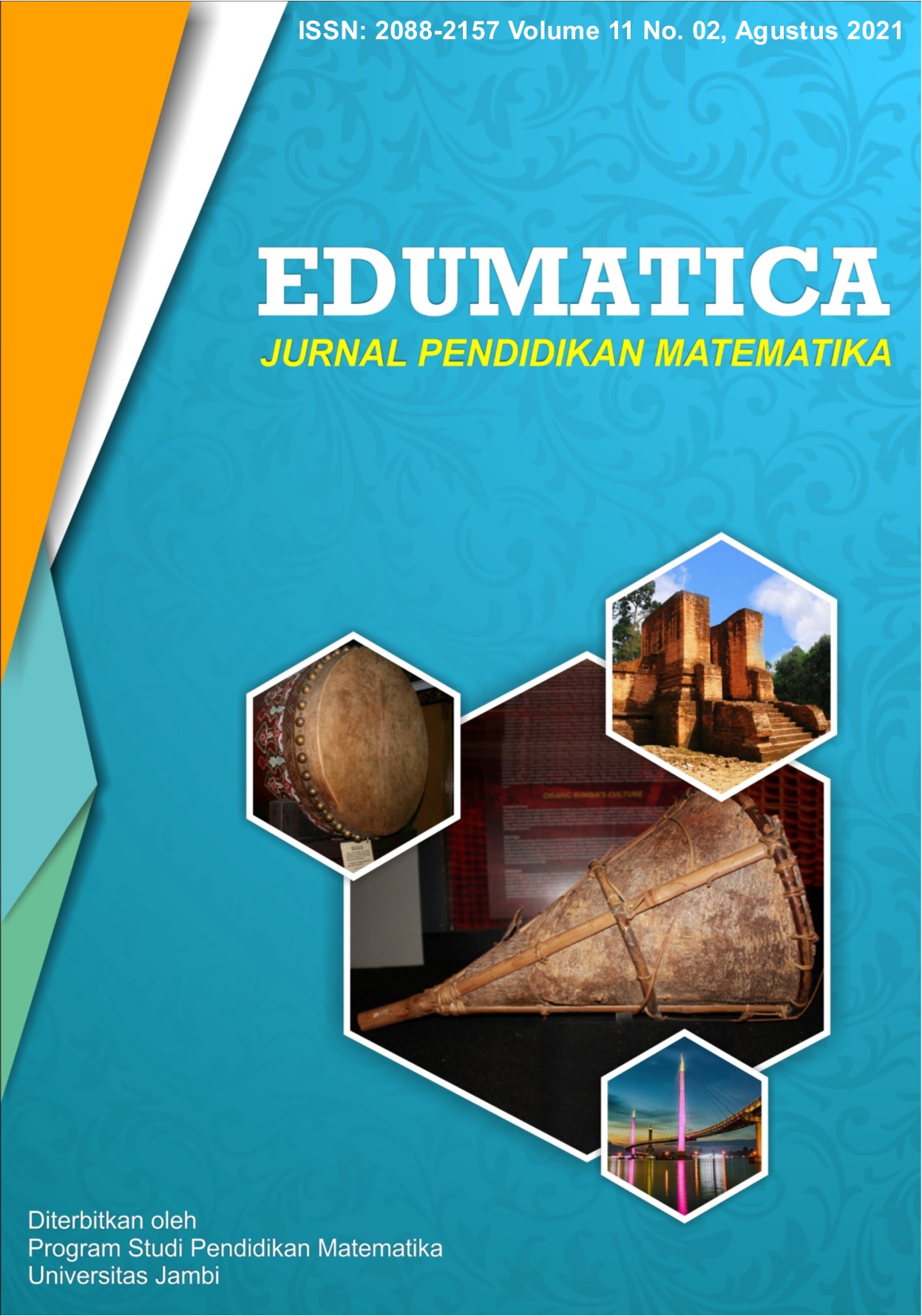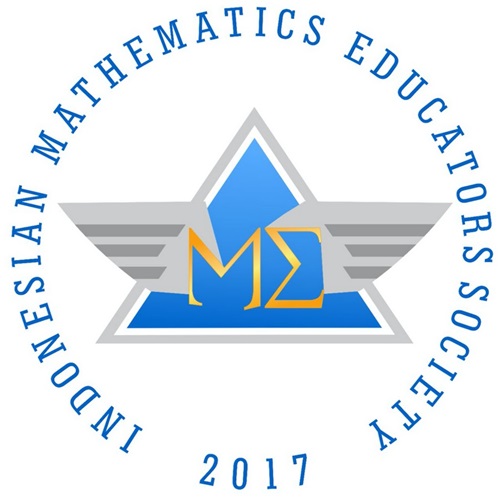Analysis of the Mathematical Problem-Solving Characteristics Based on Cognitive Style on Students in the VIII Grade
DOI:
https://doi.org/10.22437/edumatica.v11i02.11787Keywords:
cognitive style, field dependent, field independent, impulsive, problem-solving characteristics, reflectiveAbstract
This study aims to analyze the students' mathematical problem-solving characteristics based on cognitive style that is field independent, field dependent, reflective, and impulsive. Fourty-five students of VIII grade at PGRI 5 Junior High School were involved. The students were given 4 descriptive math problems. The result showed that the characteristics of independent field cognitive style showed that could understand the problems, determined the right problem planning, careless in solving, and did not re-check the answer. The subject could solve questions faster than the specified time, but the answer was wrong. For the characteristics of field dependent cognitive style, they could understand the problems, determined the right problem planning, careless in solving, and did not re-check the answer. The subject could not solve questions on time, but the answers tended to be correct. For the characteristics of reflective cognitive style, they did not understand the problems, determined the right problem planning, quite careless in solving, and did not re-check the answer. The subject could solve questions faster than the specified time, but the answer was wrong. For the characteristics of impulsive cognitive style, they did not understand the problems, determined the right problem planning, quite careless in solving, and did not re-check the answer. The subject could solve questions on time, but the answers tended to be wrong.
Downloads
References
Andriyani, A., & Ratu, N. (2018). Soal Cerita Pada Materi Program Linear Ditinjau Dari Gaya Kognitif Siswa. Jurnal Pendidikan Berkarakter, 1(1), 16-22.
Azhari, & Somakim. (n.d.). Di Kelas Vii Sekolah Menengah Pertama.
Desmita. (2009). Psikologi Perkembangan Peserta Didik. Bandung: PT. Remaja Rosdakarya.
Farmani. (2015). Pengaruh Gaya Belajar dan Modalitas Belajar terhadap Kesalahan Aljabar di SMA Negeri Denpasar. Tesis. Universitas Pendidikan Ganesha: Tidak Diterbitkan.
Geni, L., Reno, P., & Hidayah, I. (2017). Kemampuan Pemecahan Masalah Siswa pada Pembelajaran Problem Based Learning Bernuansa Etnomatematika Ditinjau dari Gaya Kognitif. Unnes Journal of Mathematics Education Research, 6(1), 11-17.
Haryanti, F., & Choirunisa. (2018). Profil Penalaran Matematika Siswa Smp Dalam Memecahkan Masalah Open Ended Ditinjau Dari Gaya Kognitif Field Dependent Dan Field Independent. MATHEdunesa, 7(2), 197-204.
Hutajulu, M., Wijaya, T. T., & Hidayat, W. (2019). the Effect of Mathematical Disposition and Learning Motivation on Problem Solving: an Analysis. Infinity Journal, 8(2), 229. https://doi.org/10.22460/infinity.v8i2.p229-238
Letteri, C. A. (1980). Cognitive Profile: Basic Determinant of Academic Achievement. The Journal of Educational Research, 73(4), 195-199. https://doi.org/10.1080/00220671.1980.10885234
Malloy, C. E., & Jones, M. G. (1998). An Investigation of African American Students' Mathematical Problem Solving. Journal for Research in Mathematics Education, 29(2), 143-163. https://doi.org/10.2307/749896
Milles, & Huberman. (1992). Analisis Data Kualitatif. Jakarta: Universitas Indonesia Press.
Polya, G. (1978). How to solve it: a new aspect of mathematical method second edition. In The Mathematical Gazette (Vol. 30, p. 181). http://www.jstor.org/stable/3609122?origin=crossref
Rahman, A. (2004). Dan Kategori Informasi.
Riswan, Muhammad, S., & Kadir. (2018). Profile of Mathematical Problem Solving Ability of Grade VII Students Reviewed From Students' Cognitive Style. Journal of Education and Research, 6(3), 159-164.
Sudiarta, I. G. P., Suryantini, N. K., & Suparta, I. N. (2016). Pembelajaranmatematika Berbasismasalahmatematika Terbuka Dengan Keterampilanmetakognitif Untuk Meningkatkan Prestasi Belajarmatematika Siswa. Prosiding Seminar Nasional MIPA, 63-68. http://ejournal.undiksha.ac.id/index.php/semnasmipa/article/view/10184
Windi, S. (2016). Profil Berpikir Metaforis (Metaphorical Thinking) Siswa SMP dalam Memecahkan Masalah Pengukuran Ditinjau dari Gaya Kognitif. Kreano Jurnal Matematika Kreatif-Inovatif, 7(2). 208-216.
Wijaya, T. T., Purnama, A., & Tanuwijaya, H. (2020). Pengembangan Media Pembelajaran Berdasarkan Konsep Tpack pada Materi Garis dan Sudut Menggunakan Hawgent Dynamic Mathematics Software. JPMI - Jurnal Pembelajaran Matematika Inovatif, 3(3), 205-214. https://doi.org/10.22460/jpmi.v1i3.205-214
Yasa, A., Sadra, I., M., & Suweken, G. (2013). e-Journal Program Pascasarjana Universitas Pendidikan Ganesha. Pengaruh Penendidikan Matematika Realistik Dan Gaya Kognitif Terhadap Prestasi Belajar Matematika Siswa, 2.
Downloads
Published
How to Cite
Issue
Section
License
Copyright (c) 2021 I Made Chandra Adi Purnama, I Nengah Suparta, I Made Ardana

This work is licensed under a Creative Commons Attribution-NonCommercial-ShareAlike 4.0 International License.







